Learning to Love in the North Cascades
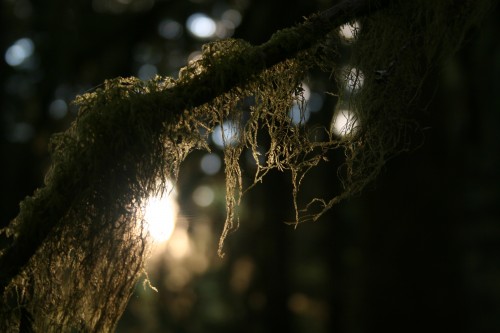
Heather Ellis is a future student of Social Work, currently on hiatus from school to work, take care of family, improve her photography, and give herself time for self-reflection and development. Born in Seattle, the North Cascades have always been in her backyard and became an integral part of her life after participating in programs hosted by North Cascades Institute.
When we arrived it was dark. We walked down to the dock and all I could see around me were the shadows of the mountains towering over us against a sky that was speckled with more stars than a strictly suburban-dwelling girl like me had ever realized existed outside of NASA photos. With all this greatness around me, I felt smaller than the tiniest ant—an insignificant speck in the cosmic fugue. I hated it. In this ever-so-humbling of arenas, the people who brought us had the gall to fill us with words of our worth:
Our deepest fear is not that we are inadequate.
Our deepest fear is that we are powerful beyond measure.
It is our light, not our darkness that frightens us.
We ask ourselves, who am I to be brilliant, gorgeous, talented, and fabulous?
Actually, who are we not to be?
It was hard for me to believe those words then. Throughout the next three weeks of outdoor lessons, backpacking, campfire talks, and projects, however, I started to think that maybe our leaders were right about us. If I hadn’t felt responsible to play a role as a steward before, after the Cascades Climate Challenge I became a better citizen who actively engages in spreading environmental awareness. The adults running the program gave us the tools to be the change by empowering us to be leaders, and encouraged us to embrace our communities with love and dedication.
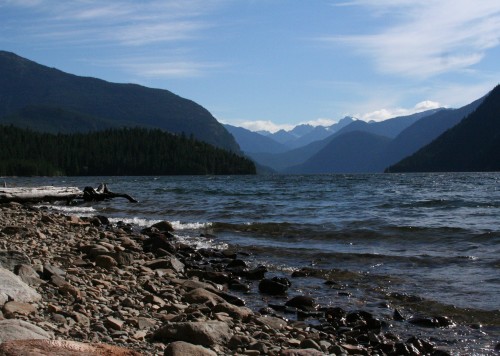 Looking across Ross Lake from Lightning Stock. Photo by the author
Looking across Ross Lake from Lightning Stock. Photo by the author
The first morning they had us ‘Yop,’ which is ‘The supreme syllable of primal self-affirmation and/or -acceptance, suitable for shouting from mountaintops.” They asked us to be present with the fact that we were there, alive, and had the power to achieve whatever we put our minds to.
These activities of self-acceptance and empowerment were far beyond my usual reach. For three years I’d been seeing an assorted handful of doctors to deal with severe anxiety and depression, and had convinced myself that I was incapable of doing anything with my life—especially because I felt alone and like I didn’t belong anywhere. Applying to Cascades Climate Challenge in the first place had been a reach for me, but it also indicated that I was ready to change. There on the dock, I realized I wanted to feel different; I wanted to be different. I wanted to believe I could make an impact, believe that I’m more than a speck.
And so that morning, I Yopped. Following my companions I walked out to the edge of the dock and bellowed out to the mountains that I was here and ready to BE. That August, I learned to be fully alive.
Cascades Climate Challenge has shaped the path I’m on today. My peers and I were given infinite love and encouragement. All this was in addition to a rich, challenging, dynamic learning environment—with the subject of our lessons surrounding us.
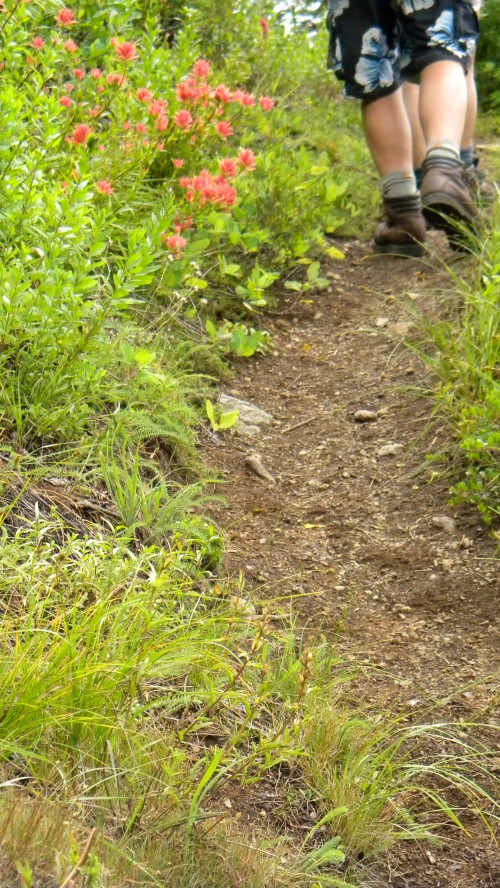 Hiking up Desolation Peak. Photo by the author
Hiking up Desolation Peak. Photo by the author
We climbed. The view from Sauk Mountain was more land than I’d ever seen before—it was achingly beautiful. When we climbed Desolation Peak my friends were there to push me up. When I came down I felt completely united with them, and I realized that I do belong on this earth, that we’re all part of the same breath. We climbed up to the place on Mt. Baker where a glacier used to be, but had receded due to increasingly warming temperatures. We learned about hydroelectric power, how the glaciers feed the waters that supply my city with electricity—and how if they melt, it will inhibit what we’re able to harness from them. We learned about how all the species in the ecosystem have niches and how they’re all interrelated. I began to ponder whether I might have a niche myself.
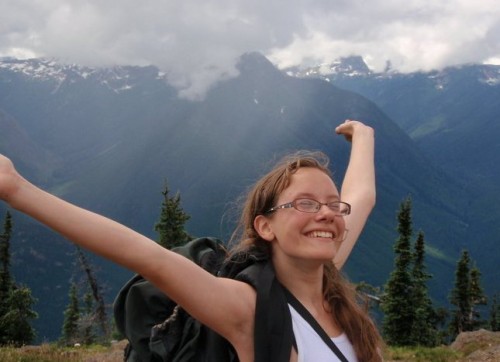 The author’s absolute joy for making it up and seeing all of the North Cascades around her. Photo by Avarie Fitzgerald
The author’s absolute joy for making it up and seeing all of the North Cascades around her. Photo by Avarie Fitzgerald
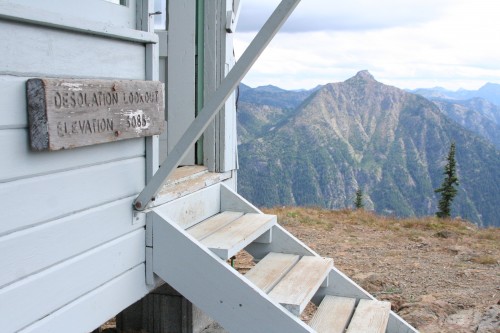 (above two photos) Desolation Lookout, where beat poet Jack Kerouac was a Fire Lookout in the summer of 1956. Photos by the author
(above two photos) Desolation Lookout, where beat poet Jack Kerouac was a Fire Lookout in the summer of 1956. Photos by the author
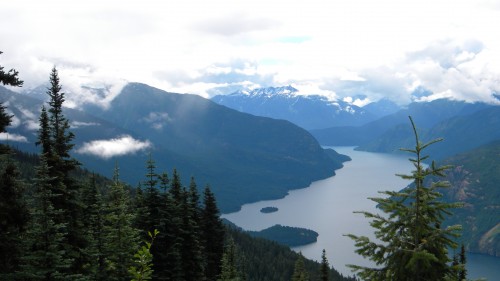 Looking at Ross Lake from the top of Desolation Peak. Photo by the author
Looking at Ross Lake from the top of Desolation Peak. Photo by the author
We got soaked in rain, and we soaked in sun. We learned about fish ecology as the Red-sided shiners in Ross Lake nibbled our toes. We stared up as the stars were shooting across the sky, leaving trails behind them. Sitting around campfires we opened up to each other.
We talked about what we were learning, and how to bring it back home. Our instructors gave us advice for effective communicating and helped us make new connections. North Cascades Institute has kept giving me help even after leaving their programs. They’ve continued to check in and give me aid on my projects whenever I’ve sent them an email and when I’ve attended their Youth Leadership Conference. The support these adults have been willing to give us is astounding; their attention is beyond just caring—it’s love they’re giving us.
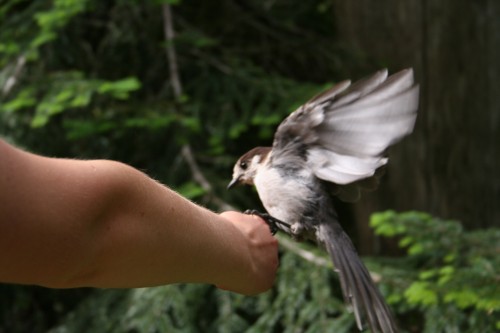 A bird on our hike at Mount Baker. Photo by the author
A bird on our hike at Mount Baker. Photo by the author
I’ve come to understand this love as the act of learning to understand, of making room for compassion, of becoming humble enough to accept you are one of many—but that many is also one. Love is being able to appreciate the beauty of all that. Cascades Climate Challenge didn’t just teach me to love the Cascades, nature, humanity, or collaborative spirit. Cascades Climate Challenge didn’t even just teach me to really love learning again. What everyone running the program and all of the amazing other students taught me was how to find a little love for myself, and in turn, a love for everything.
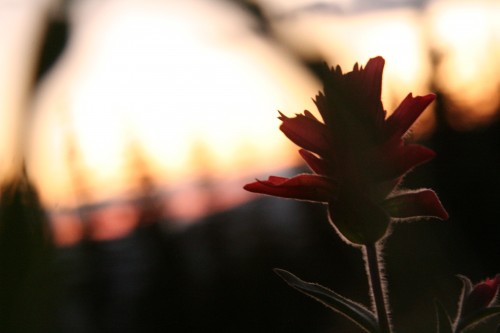 Indian Paintbrush on a North Cascades night where the light made me feel great about everything. Photo by the author
Indian Paintbrush on a North Cascades night where the light made me feel great about everything. Photo by the author
All of us left Cascades Climate Challenge with a strong urge to act. The message of how urgent an issue climate change is was one we all brought back to our communities. No matter how many service projects we did—teaching at a local middle school, forming a club at our school—we still found ourselves desiring to do more.
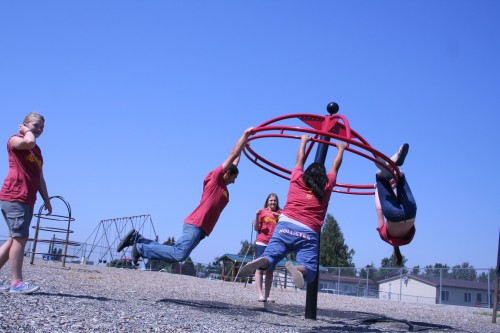 Fellow Cascades Climate Challenger group members on a playground before we went to teach lessons about climate change to YMCA camps in Mt. Vernon. Photo by the author
Fellow Cascades Climate Challenger group members on a playground before we went to teach lessons about climate change to YMCA camps in Mt. Vernon. Photo by the author
The experience inspired me to join the Environmental Youth Board with an organization called Global Visionaries, where I learned about social justice, environmental justice, and their correlations. Global Visionaries took me on a service trip to Guatemala, where I was able to expand on my understanding of how in damaging the earth we are also damaging humanity. In my senior year I continued to utilize the connections I made among peers and with staff at North Cascades Institute. Several other Cascades Climate Challenge participants are close friends of mine who went to my school, and alongside them and other interested students, we were able to revitalize the school environmental club. Calling ourselves H.O.P.E (Help Our Planet Earth), we organized trash cleanups in the neighborhood, had weekly lunch meetings to discuss environmental news, and we began making plans for our biggest project: a school assembly.
We spent months working on research, scripts, media, and a presentation on environmental sustainability and how climate change is affecting our community. With 20 students presenting, and several more behind the scenes, we created something impactful that reached our student body of 1200. What makes me happiest is that despite 70% of the club graduating last June, H.O.P.E. is still going strong.
This year I’m working to save up for college. My plan is to get a degree in social work, so that I will be better equipped to help people. I’ve come to believe that healing people is a method towards healing the planet, and vice versa. I certainly intend to keep actively participating in environmental conservation and activism through the likes of the SCA, National Park Service, and civic engagement, even as I gear more towards social justice. Trees and people can be hugged simultaneously.
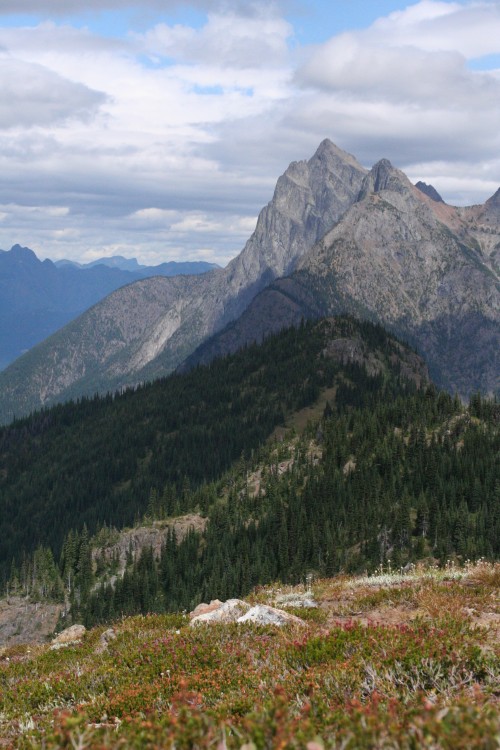 Looking out at Hozomeen from the top of Desolation Peak
Looking out at Hozomeen from the top of Desolation Peak
I often look back on how I was before North Cascades Institute came into my life, and I honestly wonder if I’d even be around without all that the experience gave me. I know that the strength to be was in me all along…but I think the people I’ve met and the experiences I’ve had because of Cascades Climate Challenge have given me the opportunities to draw up that strength. Together I believe we can heal the earth, ourselves, and lay the groundwork for a better future. I don’t just believe it, I know it.
Leading photo: Light coming up through moss at Goodell Creek Campground. Photo by the author.


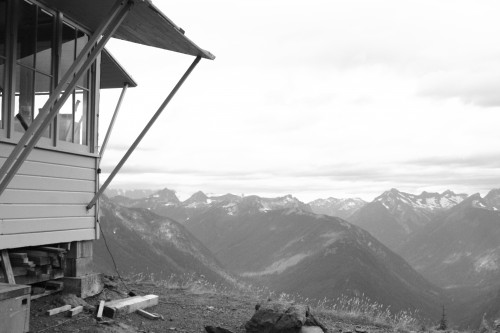
Beautiful! Congratulations Heather; NCI may have helped you find it, but all of this love and inspiration has always been a part of who you are. Best wishes to you as you continue down your path.
Heather, your quotes “Trees and people can be hugged simultaneously,” and “Together I believe we can heal the earth, ourselves, and lay the groundwork for a better future. I don’t just believe it, I know it,” are words that put a smile on my face and warm my heart. I am so proud of you. Keep up the great work and continue to spread your passion for love and life to others.
Heather, I am honored to be your father.
Heather – this is incredible! You are an inspiration and validation for why we at the Institute do what we do. Thank you for your words, and for recognizing your own power. Now go out and change the world!
Pretty inspiring stuff Heather. I enjoyed it all – your story of transformation, the power of NCI’s work, HOPE, and your quality photos. Keep on keepin on.
Thank you for courage, honesty, and insight in sharing your story. Amazing.
This brought tears to my eyes, Heather. Your story and your being are an inspiration to many and you will change the world with your heart.
Incredible story and beautifully written. You are an inspiration Heather! Best wishes for your next adventures!